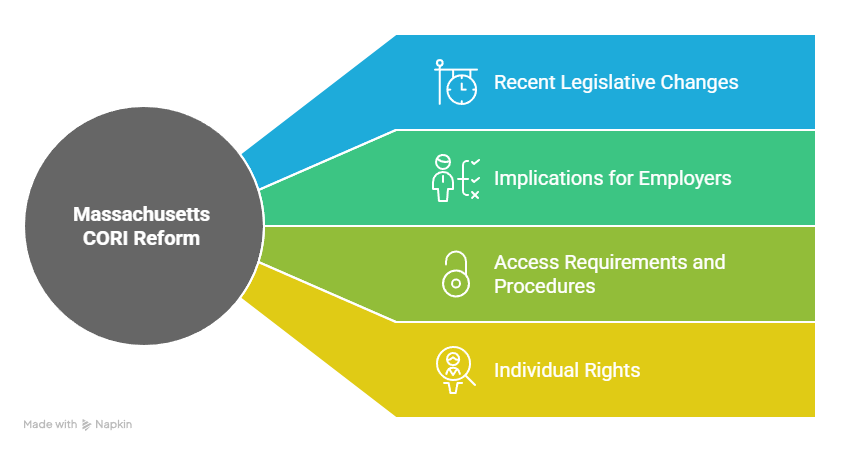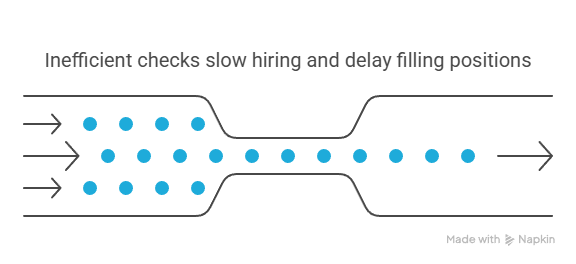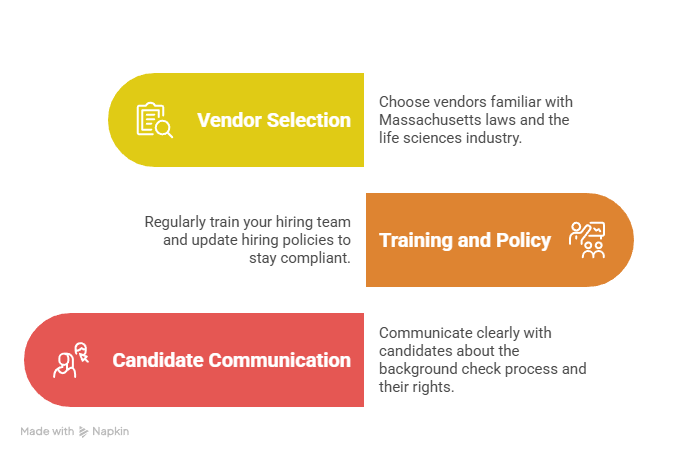Massachusetts is at the forefront of life sciences innovation, a sector that thrives on its robust workforce of over 143,000 professionals. However, alongside this growth comes the complexity of navigating background check requirements, particularly for employers and job seekers in the life sciences field. This guide will explore the Massachusetts life sciences background check landscape, highlighting key areas such as CORI reform and Chapter 93E, which collectively impact hiring practices.
Key Takeaways
- A robust employment background check system is essential for Massachusetts's life sciences sector, ensuring compliance and fair hiring.
- Massachusetts employers must navigate CORI reform and Chapter 93E to align with both state and federal laws.
- CORI reform streamlines the sealing of records, impacting how employers conduct background checks.
- Background checks for life sciences vary by role, focusing on job-specific compliance and qualifications.
- Integrating state and federal laws is crucial for a balanced and efficient background check process.
Introduction
A robust employment background check system is essential for Massachusetts's life sciences sector. With a workforce exceeding 143,000 professionals, understanding the laws and regulations surrounding background checks is not just beneficial; itâs crucial for compliance and growth. For both employers and job seekers, clarity in these processes ensures fair and effective hiring.

Massachusetts has implemented significant reforms, such as the Criminal Offender Record Information (CORI) reform and Chapter 93E, which shape the way background checks are conducted. These laws affect who gets hired and how, placing a premium on compliance with state laws while also ensuring alignment with federal regulations.
Imagine you are about to hire a candidate in this booming sector. Would you feel confident navigating these extensive legal landscapes? Understanding Massachusettsâs unique requirements could make a difference between a successful hire and a legal complication. Knowing your obligations and the rights of the candidates clarifies decisions and prevents potential pitfalls. Your adherence to these laws not only affects your organizationâs growth but also contributes to maintaining trust and fairness in the hiring environment.
Massachusetts Life Sciences Background Check Overview
A thorough Massachusetts life sciences background check involves more than just a quick glance at a candidateâs past. It starts with verifying identity, education, and employment history. These checks often extend to criminal records, credit reports, and professional licenses. Each piece helps build a complete picture of an applicantâs past.
In Massachusetts, employers must navigate specific laws, particularly the CORI reform and Chapter 93E. CORI, or Criminal Offender Record Information, affects how criminal records can be accessed and used. Chapter 93E focuses on fair employment practices, complementing federal FCRA requirements by ensuring transparency and fairness in the employment screening process.
You might wonder why these regulations matter for your hiring process. Compliance isn't just a legal obligation; itâs about ethical hiring. For instance, improper use of CORI data could lead to discrimination lawsuits and damage to your companyâs reputation. Compliance ensures you're hiring the best candidates, not just the ones who look good on paper.
Consider a candidate with an old misdemeanor that has no bearing on their ability to perform in a lab. CORI reform and fair-hiring laws prevent past mistakes from unfairly keeping someone out of a job. As an employer, understanding these nuances protects both your company and potential hires.
How well do you know your hiring practices? Engaging with proper background check procedures is more than crossing legal T's and dotting I's. Itâs about creating a fair and transparent process that fosters a diverse and qualified workforce in the booming life sciences sector.
Understanding Massachusetts CORI Reform Impact

Hiring practices in Massachusetts are deeply influenced by the Criminal Offender Record Information (CORI) system. Changes to this system have a direct impact on how employers conduct background checks.
Recent Legislative Changes
Letâs talk about the reforms to the CORI system. The Massachusetts legislature has made several changes aimed at both protecting the rights of job applicants and ensuring that employers have the right information. These changes include the shortening of the waiting period for sealing records. For example, misdemeanor records can now be sealed in 3 years, down from 5. This means that when you're reviewing a candidate's background, you may see fewer misdemeanor entries, depending on the timeline.
Implications for Employers
As an employer, these changes require you to adjust your screening processes. You need to ensure that your practices align with updated timelines for accessing and using criminal record information. It's crucial to have clear protocols for handling CORI reports. Think about how these records relate to the responsibilities of the role. Does the criminal history directly impact the duties of the position? Keep that question front and center when evaluating potential hires.
Access Requirements and Procedures
Getting access to CORI records involves clear protocols. First, you must register as a qualified entity. This means proving your need to access the data. Only after successful registration can you request CORI checks on potential employees. It's important to have a streamlined process for this, which includes obtaining written consent from the applicant.
Individual Rights
Candidates also have rights to their CORI information. They can view their records and request corrections if there are errors. This rule adds transparency and helps avoid potential misunderstandings during the hiring process. Encourage candidates to review their records in advance. This can prevent surprises during background checks and foster a smoother hiring experience for both parties.
Staying informed about these changes and requirements not only ensures compliance but also promotes a fair hiring process. Is your business keeping up with these adaptations? Consider reviewing your current practices to make sure they align with the new standards. The benefits of doing so are significant, both legally and operationally.
Chapter 93E Employment Compliance Framework
Chapter 93E is a Massachusetts law that complements the federal Fair Credit Reporting Act (FCRA) by establishing state-specific requirements for employment-related background checks. Understanding these requirements is crucial for any employer in the life sciences sector to ensure they adhere to both state and federal laws.
Chapter 93E Requirements
One significant aspect of Chapter 93E is the adverse action process. Before an employer can take any negative action based on a background check, they must provide the candidate with a copy of the report and notify them of their rights. This includes informing them of the specific details affecting their job consideration.
Itâs not just about sharing a report. Employers must also give applicants a reasonable period to dispute inaccuracies or provide context to information in the report. This transparency ensures fair consideration and can prevent issues down the road.
Chapter 93E does not operate in a vacuum. It complements the FCRA, which governs how consumer reports, including background checks, are used across the country. While FCRA requires certain notifications and disclosures, Chapter 93E offers an additional layer by requiring specific actions be taken before employment decisions are finalized.
Consumer Protection and Fair Hiring
Employers must link criminal history to job responsibilities. Chapter 93E emphasizes the relevance of any criminal records to the position in question. This means a past misdemeanor like a one-time disorderly conduct must be carefully considered against the duties of a lab technician role, for example.
Moreover, Chapter 93E puts limits on what's reportable. It restricts the reporting of criminal history that falls beyond a certain timeframe unless itâs critical to the job. This ensures that individuals are not unfairly judged on history that may no longer be relevant.
These provisions protect candidates and guide employers in making informed, fair hiring decisions. By giving candidates the chance to explain their past and limiting irrelevant report details, Chapter 93E promotes fair hiring practices.
Are you incorporating Chapter 93E and FCRA provisions into your hiring procedures? Ensuring compliance isnât just about meeting legal obligations; itâs about building trust and fairness in your hiring process.
Life Sciences Industry Context in Massachusetts
The Massachusetts life sciences sector is a powerhouse, employing around 143,000 individuals. By 2032, forecasts suggest the addition of 42,000 jobs. This growth brings with it an immense need for skilled professionals and a robust background check process to ensure a qualified workforce.
Education credentials pose one hurdle. Misunderstandings around degree requirements can stall the hiring process. It's critical to specify educational prerequisites precisely in job postings to attract the right candidates and avoid unnecessary delays.
In a field marked by rapid advancement, there's a pressing demand for talent. The ability to swiftly and accurately conduct background checks becomes crucial. Any bottleneck can hinder company growth, given the competitive nature of hiring in life sciences.
Navigating these challenges requires a streamlined approach. Structuring your background checks to be thorough yet efficient can make a significant difference. Are your current screening processes meeting the needs of this fast-paced industry? Consider revisiting them to match both state-specific regulations and the specific demands of the roles you're filling.
Industry-Specific Hiring Challenges

Navigating the hiring process in the life sciences sector can be tricky. Misunderstandings about educational requirements often create unnecessary barriers. Many candidates are deterred by unclear job descriptions that overemphasize specific degrees or certifications. Employers lose out on diverse talent due to these misconceptions.
The life sciences industry also faces high demand for skilled workers. Efficient background checks become essential. However, the process needs to be more streamlined. Bottlenecks in background check procedures can delay hiring, making it harder for companies to fill crucial positions promptly.
What steps can you take? For starters, review job descriptions for accuracy and clarity. Consider practical experience alongside formal education. This perspective broadens your candidate pool, allowing you to attract individuals who might not have the standard qualifications but possess the right skills and mindset for growth.
Consider the background check process itself. Is it efficient? Cut down on unnecessary steps while maintaining compliance. Use clear communication to keep candidates informed about timelines and requirements. This approach not only speeds up hiring but also enhances candidate experience.
Where does your organization stand in addressing these challenges? Are your job postings precise enough to attract the right talent? Is your background check process seamless, or could it use some refinement? Engaging with these questions can lead to a more successful hiring strategy in the life sciences field.
Compliance Implementation Framework
When conducting background checks in the Massachusetts life sciences sector, tailoring screening protocols to specific job roles is crucial. Different roles in the life sciences industry demand tailored background checks based on their responsibilities and risks. Let's break it down by position.
| Area | Screening Priorities |
|---|---|
| Research and Development | These roles focus heavily on innovation and intellectual property. Conducting background checks for these positions involves looking into any past incidents related to data breaches or intellectual property theft. You may also want to assess any history of regulatory violations that may imply risks to the companyâs trade secrets. |
| Manufacturing | Positions in this area often require compliance with both safety and substance regulations. For example, positions that involve handling controlled substances will necessitate DEA background checks. Evaluating candidatesâ past employment records for adherence to safety protocols is crucial, ensuring they have a history of maintaining compliant and safe work environments. |
| Clinical Positions | These jobs often require working with patients or in healthcare settings, necessitating healthcare-specific background checks. This can include verifying state licenses and certifications to confirm they are active and in good standing. You should also screen for any sanctions or disciplinary actions recorded against those licenses. |
When implementing these protocols, consider the specific legal requirements of Massachusetts and how they interact with federal laws. Adjust your screening practices to ensure both compliance and the protection of your companyâs interests.
Federal Regulatory Integration
Creating an effective background check system in Massachusetts requires understanding both state and federal rules. The Fair Credit Reporting Act (FCRA) sets the federal standards. It dictates how background checks should be conducted across the country. But how do you align these federal requirements with Massachusetts-specific laws like the CORI reform and Chapter 93E?
Start with the basics: consent. FCRA requires employers to get written permission from potential employees before accessing their background information. This aligns with Massachusetts laws, which also emphasize transparency and consent. Ensuring every candidate is aware of their rights is your first step towards compliance.
Next is the adverse action process. If you decide not to hire someone based on their background report, FCRA mandates that you notify the individual. Chapter 93E complements this by specifically addressing notification requirements within Massachusetts. Make sure your notification process meets the guidelines from both sets of regulations.
Consider the limitations on information usage. FCRA prohibits using outdated information, such as arrests older than seven years, unless the position pays over a certain threshold. Massachusetts law adds another layer of protection by restricting the use of certain criminal data, particularly sealed or expunged records, reflecting a broader commitment to fair hiring practices.
How do you maintain compliance across these varying regulations without slowing down the hiring process? Consistent training for HR teams can bridge the gap. This builds a culture of awareness and ensures everyone understands the importance of dual compliance. Regularly update your policies to reflect changes in either state or federal laws.
For employers targeting a diverse, qualified workforce in Massachusetts's innovative life sciences field, integrating federal and state laws into your screening process is not just a legal requirementâit's a strategy for fostering trust and building a stronger team. Is your current screening protocol optimized to align with both state and federal requirements?
Best Practices and Implementation

Vendor Selection Criteria
Finding the right partner for background checks in the life sciences sector isn't a task to skim over. Focus on vendors who understand Massachusetts laws and the nuances of the life sciences industry. Ensure they know CORI reform and Chapter 93E thoroughly. Ask about their experience with pharmaceutical companies, biotech firms, or medical device manufacturers. Check their track record in handling industry-specific checks, like intellectual property security. Prioritize those who can provide quick, accurate results without compromising on compliance.
Training and Policy Development
Compliance in background checks is a moving target. Regular training for your hiring team keeps them sharp. Workshops or online courses on state and federal laws can be helpful. Update your hiring policies as laws change. This keeps procedures relevant and staff informed. Train your team to communicate what parts of the criminal record might affect employment, keeping conversations transparent.
Candidate Communication Strategies
Candidates appreciate transparency. Make sure your communication is clear, concise, and covers all steps of the background check process. Let them know what to expect, how long checks might take, and what their rights are. If part of a background check affects their eligibility, explain how. This not only builds trust but also streamlines your operations, reducing confusion and back-and-forth.
Common Implementation Challenges
Navigating multijurisdictional compliance can be tricky. When hiring out-of-state candidates, you may encounter hurdles. Each state has its background check regulations, making interstate verification challenging. Ensure you're familiar with both Massachusetts and the candidateâs state laws to avoid legal pitfalls. Look for background check services that offer expertise in handling multistate cases.
Timing is another hurdle. Balancing speed with thoroughness is crucial. A quick hire is beneficial, but not at the risk of missing crucial information. To achieve this, streamline your process. Set clear timelines and expectations. Use technology to automate some tasks without compromising on detail. This can help keep processes efficient and comprehensive.
Multijurisdictional compliance and timing issues can slow you down. How much is it affecting your hiring process now? Consider reviewing your strategies to improve efficiency. Adjustments here could make a difference in maintaining a competitive edge in the talent market.
Conclusion
Navigating the complexities of a Massachusetts life sciences background check requires a thorough understanding of both CORI reform and Chapter 93E compliance requirements. As the state's life sciences sector continues its rapid growth, employers must balance efficient hiring practices with strict adherence to evolving legal frameworks. The integration of federal FCRA requirements with Massachusetts-specific regulations creates a comprehensive but challenging compliance landscape that demands careful attention to detail. By implementing industry-specific screening protocols and maintaining transparent communication with candidates, organizations can build trust while protecting their interests. Successful Massachusetts life sciences background check programs ultimately depend on staying current with regulatory changes and partnering with knowledgeable vendors who understand the unique demands of this critical industry. With proper implementation, these background check requirements serve not as barriers but as foundations for building a qualified, trustworthy workforce that drives innovation in Massachusetts's thriving life sciences ecosystem.
Frequently Asked Questions
What does a background check show in Massachusetts?
A background check in Massachusetts can reveal criminal records, employment history, education verification, credit history, and more. It offers details that help assess a person's past and qualifications.
What do they find out on a background check?
Background checks commonly include criminal records, credit score, employment verification, education history, and sometimes driving records. They provide a comprehensive view of someone's history.
What shows up on a CORI check in Massachusetts?
A CORI (Criminal Offender Record Information) check in Massachusetts displays criminal records. It includes data on arrests, convictions, and incarceration within the state.
How much is a background check in Massachusetts?
The cost of a background check in Massachusetts varies based on the level of detail needed. Basic checks can start around $25, while more detailed reports may cost more.
How long does a Massachusetts background check take?
A standard background check in Massachusetts typically takes 1 to 3 business days. More extensive investigations might require additional time.
What information do employers usually require for a background check?
Employers often request your full name, date of birth, social security number, and consent to conduct the background check. This information helps ensure accurate results.
Can you dispute errors in a background check report?
Yes, if you find errors in your background check report, you can dispute them with the company that performed the check. They are obligated to investigate and correct any inaccuracies.
Are there restrictions on what can be reported in a background check?
Yes, under Massachusetts law, some older convictions or certain types of information may not be reported after a specific period. Employers must also comply with state and federal laws regarding non-discrimination.
Do you need permission to conduct a background check in Massachusetts?
Yes, you must obtain written consent from the individual before conducting a background check. This is a legal requirement to protect personal information.
How secure is the information in a background check?
Companies conducting background checks must follow strict guidelines to protect personal information. They are required to maintain high security standards to ensure the confidentiality of the data.
Additional Resources
- Implementing CORI Reform
https://www.mass.gov/doc/implementing-cori-reform/download - Massachusetts General Laws, Chapter 93E
https://iprospectcheck.com/new-background-check-laws - CORI Acknowledgement Form (MGH Institute of Health Professions)
https://www.mghihp.edu/sites/default/files/2023-01/cori_form_current_8_10_21.pdf

GCheck Editorial Team
Meet the GCheck Editorial Team, your trusted source for insightful and up-to-date information in the world of employment background checks. Committed to delivering the latest trends, best practices, and industry insights, our team is dedicated to keeping you informed.
With a passion for ensuring accuracy, compliance, and efficiency in background screening, we are your go-to experts in the field. Stay tuned for our comprehensive articles, guides, and analysis, designed to empower businesses and individuals with the knowledge they need to make informed decisions.
At GCheck, we're here to guide you through the complexities of background checks, every step of the way.





